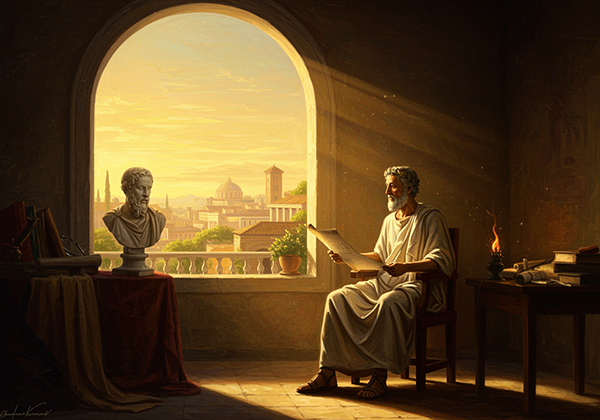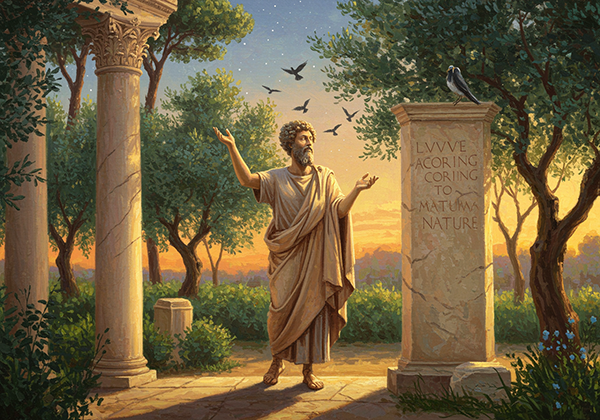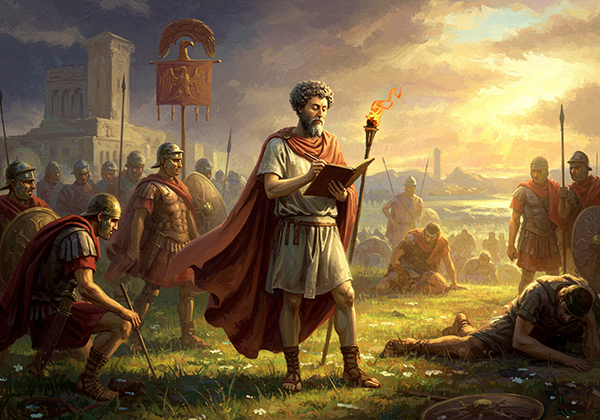Meditations by Marcus Aurelius : Book Summary
 Download eBook | Paperback | Hardcover
Download eBook | Paperback | Hardcover
Book 1: Gratitude and Influences
Marcus opens his meditations by expressing deep gratitude to the people who shaped his moral character. He thanks his grandfather for teaching him good manners, his father for integrity and modesty, his mother for generosity and piety, and his teachers for instilling in him a love for philosophy, reason, and justice. He appreciates the examples set by each person in his life—from Rusticus, who introduced him to Stoicism, to Maximus, who modeled patience and kindness. This first book is essentially Marcus’s foundation—it demonstrates his humility and willingness to learn from others. It shows that his wisdom wasn’t born of isolation but cultivated through meaningful relationships and careful observation.
Key Lesson : Recognize and appreciate the virtues in others. Gratitude for one’s influences fosters humility and self-awareness, the first steps toward wisdom.
Book 2: The Nature of Man and Daily Discipline
This book, likely written while on a military campaign, deals with the challenge of maintaining virtue in daily life. Marcus reminds himself that each day he will meet selfish, rude, or ignorant people—but he must not be angry, for they are acting according to their limited understanding. He emphasizes that humans are rational and social beings. Thus, it is natural and right to act with justice, self-control, and purpose. He reflects on how short life is and urges himself not to be distracted by fame or pleasure. Instead, he insists on focusing on fulfilling his role and using every moment wisely.
Key Lesson : Expect adversity from others, but respond with patience and virtue. Your purpose is to act according to your nature—rationally and justly.

Book 3: The Inner Citadel
Marcus explores the importance of self-mastery and rational thought. He reflects that the soul should remain untouched by the chaos of the outside world. Whatever happens externally is neither good nor bad—it is our judgment that assigns value. He reminds himself to act according to reason and avoid being swayed by passion, fear, or distraction. Life is too short to worry about others’ opinions. He urges focus on the present moment and the cultivation of inner peace through clarity of mind. One must live in harmony with nature, accept fate, and keep one’s moral compass intact.
Key Lesson : True freedom comes from controlling your mind. Guard your inner peace and base your actions on reason, not emotion.
Book 4: Accepting Change and Impermanence
In this book, Marcus reflects on the impermanence of all things. He writes that everything changes—bodies decay, people die, empires fall. He accepts this reality without sadness, viewing change as part of the natural order. He considers the futility of fame and material wealth, noting that even the most celebrated figures are forgotten in time. He advises focusing on one’s duty rather than external rewards. The Stoic goal is not to be untouched by change, but to live well within it—calmly and virtuously.
Key Lesson : Embrace impermanence. Everything passes, so live with integrity, not attachment to transient things.

Book 5: The Call to Action and Responsibility
Marcus starts this book by addressing his own reluctance to rise in the morning—he reminds himself that he was made to work and serve others. Life is about fulfilling one’s role, not indulging in comfort. He emphasizes that action should be guided by justice and reason. One should not waste time complaining or indulging in desires. Each moment is a gift and an opportunity to live in accordance with nature. He also touches on the idea of fulfilling one’s social duties with sincerity and selflessness.
Key Lesson : You were made to act, not to rest. Each day is a chance to serve others and live with purpose.
Book 6: Mastery Over Emotion and Thought
Marcus returns to the theme that suffering often stems from our own misjudgment. He emphasizes that we should not let ourselves be ruled by anger, desire, or fear. External events are beyond our control, but our responses are entirely up to us. He warns against becoming a slave to passions or living according to others’ approval. Wisdom lies in recognizing that everything is opinion—our ability to reinterpret events is key. He also speaks about the unity of all beings and the importance of kindness, even when others fail to act virtuously.
Key Lesson : Master your judgments and emotions. Suffering often comes from your interpretation, not the event itself.

Book 7: Nature, Duty, and Perspective
Here, Marcus explores life’s brevity and the importance of perspective. He urges detachment from praise and criticism, reiterating that fame is meaningless. Everyone, from emperors to beggars, meets the same end. He also reflects on how nature has equipped us to bear hardships and carry out our roles. Even pain, if accepted with understanding, can be bearable. The idea that we are part of a greater whole is central—our duty is to live according to the nature of that whole. He advises not to waste time in idle talk or vanity.
Key Lesson : Keep perspective. Fame and pain are fleeting, but virtue and duty endure beyond them.
Book 8: Simplicity and Integrity
Marcus stresses the value of honesty, simplicity, and moral clarity. He warns against theatrical displays of virtue and encourages authentic behavior. Hypocrisy, pretense, and ego are enemies of the Stoic path. He urges himself to be straightforward in speech and action, to work diligently without seeking reward, and to live simply. He also explores the concept of justice as doing one’s duty without needing recognition. He reflects on the logos, the divine reason that pervades the universe, and our responsibility to align with it.
Key Lesson : Live with simplicity, integrity, and purpose. True virtue needs no recognition—only consistency.
Book 9: Dealing with Injustice and Human Behavior
In this section, Marcus reflects on the inevitability of encountering rude or dishonest people. He emphasizes that these individuals act according to their limited understanding, not out of deliberate malice. It is irrational to expect others never to err. Instead, we should treat them with patience and compassion. Marcus returns to the idea that no one can truly harm us unless we let them. Justice involves doing the right thing regardless of others’ behavior. He also warns against gossip, manipulation, and pride.
Key Lesson: Don’t take offense easily. Others act from ignorance, and your virtue must not depend on their actions.
Book 10: Clarity of Purpose
Marcus continues reflecting on death, fame, and detachment. He urges himself to stop postponing self-improvement and to let go of things that distract from virtue. He stresses the importance of living each moment fully and sincerely. He writes that we should focus only on what is essential and disregard anything unnecessary. Marcus encourages an internal life free from illusion and pretense. He criticizes the craving for validation and urges alignment with nature, reason, and duty. One’s goal should be to contribute meaningfully, not to be praised.
Key Lesson : Strip away the nonessential. Focus only on what helps you live a virtuous, present-minded life.
Book 11: Honesty, Speech, and Social Responsibility
Marcus reflects on the power of words and how they can be used for truth or deception. He emphasizes plain, honest communication and warns against flattery, gossip, and falsehood. Speech should be clear, necessary, and aligned with reason. He also writes about the importance of being part of a community and fulfilling one’s role within it. We are social creatures and must contribute to the common good. This book also contains reminders to avoid arrogance and not be swayed by public opinion.
Key Lesson : Speak truthfully and act justly. As a social being, your virtue must serve both truth and community.
Book 12: Mortality and Letting Go
The final book returns to the inevitability of death and the importance of letting go. Marcus emphasizes that the past and future are not within our control—only the present moment matters. He advises against being ruled by desire, anxiety, or fear. One must accept death as natural and live life as a service to the universe. Legacy, memory, and fame are illusions that distract from a meaningful life. He urges clarity, simplicity, and obedience to reason. The best life is one lived with integrity, present awareness, and gratitude for existence.
Key Lesson : Let go of fear and live in the present. Death is natural—what matters is how you live now.
Final Thoughts:
Marcus Aurelius wrote Meditations not for others, but for himself. What makes it powerful is its raw honesty and unwavering commitment to virtue. Across these 12 books, he struggles with the same challenges we all do—anger, distraction, doubt, fear—yet continually returns to reason, duty, and perspective. His words are a guide for anyone seeking clarity, peace, and moral strength in a chaotic world.
Sample Chapters from the Book:
Book One:
From my grandfather Verus I learned good morals and the government of my temper.
* * * * *
From the reputation and remembrance of my father, modesty and a manly character.
* * * * *
From my mother, piety and beneficence, and abstinence, not only from evil deeds, but even from evil thoughts; and further, simplicity in my way of living, far removed from the habits of the rich.
* * * * *
From my great-grandfather, not to have frequented public schools, and to have had good teachers at home, and to know that on such things a man should spend liberally.
* * * * *
From my governor, to be neither of the green nor of the blue party at the games in the Circus, nor a partizan either of the Parmularius or the Scutarius at the gladiators’ fights; from him too I learned endurance of labour, and to want little, and to work with my own hands, and not to meddle with other people’s affairs, and not to be ready to listen to slander.
* * * * *
From Diognetus, not to busy myself about trifling things, and not to give credit to what was said by miracle-workers and jugglers about incantations and the driving away of daemons and such things; and not to breed quails for fighting, nor to give myself up passionately to such things; and to endure freedom of speech; and to have become intimate with philosophy; and to have been a hearer, first of Bacchius, then of Tandasis and Marcianus; and to have written dialogues in my youth; and to have desired a plank bed and skin, and whatever else of the kind belongs to the Grecian discipline.
* * * * *
From Rusticus I received the impression that my character required improvement and discipline; and from him I learned not to be led astray to sophistic emulation, nor to writing on speculative matters, nor to delivering little hortatory orations, nor to showing myself off as a man who practises much discipline, or does benevolent acts in order to make a display; and to abstain from rhetoric, and poetry, and fine writing; and not to walk about in the house in my outdoor dress, nor to do other things of the kind; and to write my letters with simplicity, like the letter which Rusticus wrote from Sinuessa to my mother; and with respect to those who have offended me by words, or done me wrong, to be easily disposed to be pacified and reconciled, as soon as they have shown a readiness to be reconciled; and to read carefully, and not to be satisfied with a superficial understanding of a book; nor hastily to give my assent to those who talk overmuch; and I am indebted to him for being acquainted with the discourses of Epictetus, which he communicated to me out of his own collection.
* * * * *
From Apollonius I learned freedom of will and undeviating steadiness of purpose; and to look to nothing else, not even for a moment, except to reason; and to be always the same, in sharp pains, on the occasion of the loss of a child, and in long illness; and to see clearly in a living example that the same man can be both most resolute and yielding, and not peevish in giving his instruction; and to have had before my eyes a man who clearly considered his experience and his skill in expounding philosophical principles as the smallest of his merits; and from him I learned how to receive from friends what are esteemed favours, without being either humbled by them or letting them pass unnoticed.
* * * * *
From Sextus, a benevolent disposition, and the example of a family governed in a fatherly manner, and the idea of living conformably to nature; and gravity without affectation, and to look carefully after the interests of friends, and to tolerate ignorant persons, and those who form opinions without consideration: he had the power of readily accommodating himself to all, so that intercourse with him was more agreeable than any flattery; and at the same time he was most highly venerated by those who associated with him: and he had the faculty both of discovering and ordering, in an intelligent and methodical way, the principles necessary for life; and he never showed anger or any other passion, but was entirely free from passion, and also most affectionate; and he could express approbation without noisy display, and he possessed much knowledge without ostentation.
* * * * *
From Alexander the grammarian, to refrain from fault-finding, and not in a reproachful way to chide those who uttered any barbarous or solecistic or strange-sounding expression; but dexterously to introduce the very expression which ought to have been used, and in the way of answer or giving confirmation, or joining in an inquiry about the thing itself, not about the word, or by some other fit suggestion.
* * * * *
From Fronto I learned to observe what envy, and duplicity, and hypocrisy are in a tyrant, and that generally those among us who are called Patricians are rather deficient in paternal affection.
* * * * *
From Alexander the Platonic, not frequently nor without necessity to say to any one, or to write in a letter, that I have no leisure; nor continually to excuse the neglect of duties required by our relation to those with whom we live, by alleging urgent occupations.
* * * * *
From Catulus, not to be indifferent when a friend finds fault, even if he should find fault without reason, but to try to restore him to his usual disposition; and to be ready to speak well of teachers, as it is reported of Domitius and Athenodotus; and to love my children truly.
* * * * *
From my brother Severus, to love my kin, and to love truth, and to love justice; and through him I learned to know Thrasea, Helvidius, Cato, Dion, Brutus; and from him I received the idea of a polity in which there is the same law for all, a polity administered with regard to equal rights and equal freedom of speech, and the idea of a kingly government which respects most of all the freedom of the governed; I learned from him also consistency and undeviating steadiness in my regard for philosophy; and a disposition to do good, and to give to others readily, and to cherish good hopes, and to believe that I am loved by my friends; and in him I observed no concealment of his opinions with respect to those whom he condemned, and that his friends had no need to conjecture what he wished or did not wish, but it was quite plain.
* * * * *
From Maximus I learned self-government, and not to be led aside by anything; and cheerfulness in all circumstances, as well as in illness; and a just admixture in the moral character of sweetness and dignity, and to do what was set before me without complaining. I observed that everybody believed that he thought as he spoke, and that in all that he did he never had any bad intention; and he never showed amazement and surprise, and was never in a hurry, and never put off doing a thing, nor was perplexed nor dejected, nor did he ever laugh to disguise his vexation, nor, on the other hand, was he ever passionate or suspicious. He was accustomed to do acts of beneficence, and was ready to forgive, and was free from all falsehood; and he presented the appearance of a man who could not be diverted from right rather than of a man who had been improved. I observed, too, that no man could ever think that he was despised by Maximus, or ever venture to think himself a better man. He had also the art of being humorous in an agreeable way.
Book Two:
Among the Quadi at the Granua
Begin the morning by saying to thyself, I shall meet with the busy-body, the ungrateful, arrogant, deceitful, envious, unsocial. All these things happen to them by reason of their ignorance of what is good and evil. But I who have seen the nature of the good that it is beautiful, and of the bad that it is ugly, and the nature of him who does wrong, that it is akin to me, not only of the same blood or seed, but that it participates in the same intelligence and the same portion of the divinity, I can neither be injured by any of them, for no one can fix on me what is ugly, nor can I be angry with my kinsman, nor hate him, For we are made for co-operation, like feet, like hands, like eyelids, like the rows of the upper and lower teeth. To act against one another then is contrary to nature; and it is acting against one another to be vexed and to turn away.
* * * * *
Whatever this is that I am, it is a little flesh and breath, and the ruling part. Throw away thy books; no longer distract thyself: it is not allowed; but as if thou wast now dying, despise the flesh; it is blood and bones and a network, a contexture of nerves, veins, and arteries. See the breath also, what kind of a thing it is, air, and not always the same, but every moment sent out and again sucked in. The third then is the ruling part: consider thus: Thou art an old man; no longer let this be a slave, no longer be pulled by the strings like a puppet to unsocial movements, no longer either be dissatisfied with thy present lot, or shrink from the future.
* * * * *
All that is from the gods is full of Providence. That which is from fortune is not separated from nature or without an interweaving and involution with the things which are ordered by Providence. From thence all things flow; and there is besides necessity, and that which is for the advantage of the whole universe, of which thou art a part. But that is good for every part of nature which the nature of the whole brings, and what serves to maintain this nature. Now the universe is preserved, as by the changes of the elements so by the changes of things compounded of the elements. Let these principles be enough for thee, let them always be fixed opinions. But cast away the thirst after books, that thou mayest not die murmuring, but cheerfully, truly, and from thy heart thankful to the gods.
* * * * *
Remember how long thou hast been putting off these things, and how often thou hast received an opportunity from the gods, and yet dost not use it. Thou must now at last perceive of what universe thou art a part, and of what administrator of the universe thy existence is an efflux, and that a limit of time is fixed for thee, which if thou dost not use for clearing away the clouds from thy mind, it will go and thou wilt go, and it will never return.
* * * * *
Every moment think steadily as a Roman and a man to do what thou hast in hand with perfect and simple dignity, and feeling of affection, and freedom, and justice; and to give thyself relief from all other thoughts. And thou wilt give thyself relief, if thou doest every act of thy life as if it were the last, laying aside all carelessness and passionate aversion from the commands of reason, and all hypocrisy, and self-love, and discontent with the portion which has been given to thee. Thou seest how few the things are, the which if a man lays hold of, he is able to live a life which flows in quiet, and is like the existence of the gods; for the gods on their part will require nothing more from him who observes these things.
* * * * *
Do wrong to thyself, do wrong to thyself, my soul; but thou wilt no longer have the opportunity of honouring thyself. Every man’s life is sufficient. But thine is nearly finished, though thy soul reverences not itself but places thy felicity in the souls of others.
* * * * *
Do the things external which fall upon thee distract thee? Give thyself time to learn something new and good, and cease to be whirled around. But then thou must also avoid being carried about the other way. For those too are triflers who have wearied themselves in life by their activity, and yet have no object to which to direct every movement, and, in a word, all their thoughts.
* * * * *
Through not observing what is in the mind of another a man has seldom been seen to be unhappy; but those who do not observe the movements of their own minds must of necessity be unhappy.
* * * * *
This thou must always bear in mind, what is the nature of the whole, and what is my nature, and how this is related to that, and what kind of a part it is of what kind of a whole; and that there is no one who hinders thee from always doing and saying the things which are according to the nature of which thou art a part.
* * * * *
Theophrastus, in his comparison of bad acts – such a comparison as one would make in accordance with the common notions of mankind – says, like a true philosopher, that the offences which are committed through desire are more blameable than those which are committed through anger. For he who is excited by anger seems to turn away from reason with a certain pain and unconscious contraction; but he who offends through desire, being overpowered by pleasure, seems to be in a manner more intemperate and more womanish in his offences. Rightly then, and in a way worthy of philosophy, he said that the offence which is committed with pleasure is more blameable than that which is committed with pain; and on the whole the one is more like a person who has been first wronged and through pain is compelled to be angry; but the other is moved by his own impulse to do wrong, being carried towards doing something by desire.
* * * * *
Since it is possible that thou mayest depart from life this very moment, regulate every act and thought accordingly. But to go away from among men, if there are gods, is not a thing to be afraid of, for the gods will not involve thee in evil; but if indeed they do not exist, or if they have no concern about human affairs, what is it to me to live in a universe devoid of gods or devoid of Providence? But in truth they do exist, and they do care for human things, and they have put all the means in man’s power to enable him not to fall into real evils. And as to the rest, if there was anything evil, they would have provided for this also, that it should be altogether in a man’s power not to fall into it. Now that which does not make a man worse, how can it make a man’s life worse? But neither through ignorance, nor having the knowledge, but not the power to guard against or correct these things, is it possible that the nature of the universe has overlooked them; nor is it possible that it has made so great a mistake, either through want of power or want of skill, that good and evil should happen indiscriminately to the good and the bad. But death certainly, and life, honour and dishonour, pain and pleasure, all these things equally happen to good men and bad, being things which make us neither better nor worse. Therefore they are neither good nor evil.
* * * * *








